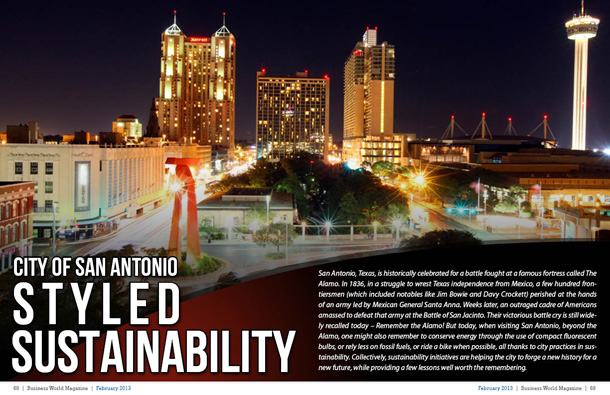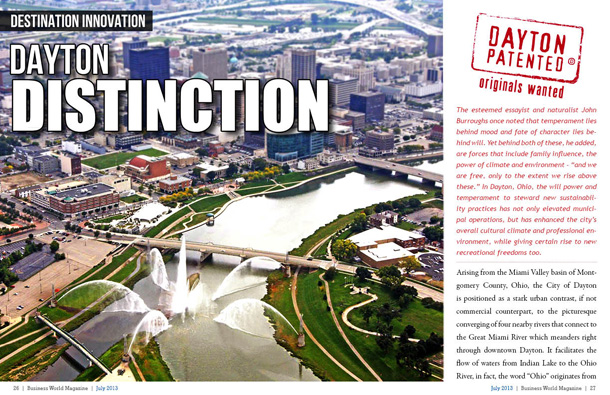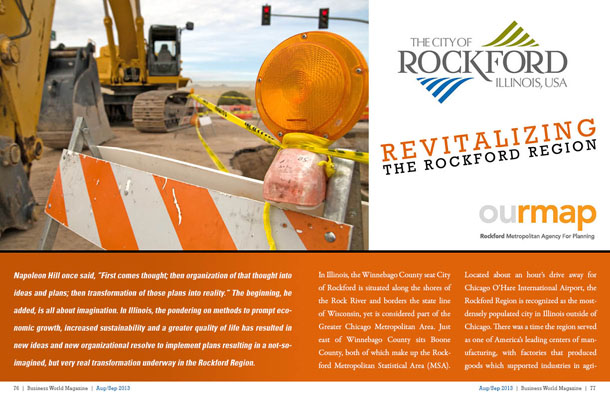

San Antonio, Texas, is historically celebrated for a battle fought at a famous fortress called The Alamo. In 1836, in a struggle to wrest Texas independence from Mexico, a few hundred frontiersmen (which included notables like Jim Bowie and Davy Crockett) perished at the hands of an army led by Mexican General Santa Anna. Weeks later, an outraged cadre of Americans amassed to defeat that army at the Battle of San Jacinto. Their victorious battle cry is still widely recalled today – Remember the Alamo! But today, when visiting San Antonio, beyond the Alamo, one might also remember to conserve energy through the use of compact fluorescent bulbs, or rely less on fossil fuels, or ride a bike when possible, all thanks to city practices in sustainability. Collectively, sustainability initiatives are helping the city to forge a new history for a new future, while providing a few lessons well worth the remembering.
The City of San Antonio has emerged as a national model of how to build collaborations, develop programs and effectively implement solutions that result in beneficial changes in terms of conservation of energy, improved air & water quality, and substantial cost savings that strengthen its economic stability, and not only for the long term, but here and now.
Mayor Julián Castro says San Antonio “has a long, proactive history of pursuing sustainable development†which he credits to beginning some 13 years ago with the leadership of former Mayor Howard Peak. At that time, San Antonio voters approved a 1/8-cent sales tax to purchase and preserve property over the recharge zone of the city’s primary source of drinking water, known as the Edwards Aquifer. Since that time, voters have re-authorized the sales tax twice, effectively preserving some 20,000 acres of sensitive land. In 2009, another initiative known as the Mission Verde Plan was spurred to being through the leadership of Mayor Phil Hardberger. Castro says with “Mission Verde’s core tenets of advanced energy infrastructure, clean technology development, green jobs, sustainable buildings, integrated transportation and land use, the City began positioning itself to be a leader in sustainable economic development.â€
Upon Castro’s election in 2009, he devoted his administration to setting sustainability efforts into action under the auspices of a community-wide visioning effort called SA2020. As a board member of San Antonio’s municipal-owned utility company, CPS Energy, Castro spearheaded a ten-year, $50 million agreement between the utility and the University of Texas at San Antonio to position the community as a national leader in green technology research. “The creation of the Texas Sustainable Energy Research Institute at UTSA is a game-changing partnership that will help the utility invest ratepayer money wisely at a time when utilities across the country are working to implement sustainable technologies,†says Castro. “In addition, CPS Energy, in partnership with the City, has leveraged its large customer base to create hundreds of green energy jobs while expanding its green energy portfolio.â€
Today, CPS Energy not only ranks #1 in wind-energy capacity among municipally owned utilities, but also #1 in Texas for the amount of solar-generated electricity under contract.
Castro says what most sets San Antonio apart from other communities is “the multi-pronged, multi-agency approach to moving the needle when it comes to sustainability.†Through SA2020, he says the entire community is embracing the push for greener, more sustainable practices.
Benefitting Residents & Business Alike
Mary Hammer is the Interim Director of San Antonio’s Office of Sustainability. She offers numerous examples of enacted measures which have already proven to provide benefits to residents of the community as well as operating businesses.
“For example, through the implementation of a weatherization program, energy improvements were provided to more than 3,000 low-income households, an initiative that improved the homes of families in need, saving them on average $600 per year while also teaching them how to conserve energy within their home.
The upgrades that were made are straightforward: sealing up air leaks, replacing standard incandescent bulbs with energy efficient compact fluorescent models, blowing insulation into the attic and walls, applying tinted coverings to windows, upgrading HVAC systems, and replacing inefficient appliances. These alterations when taken together can lead to big savings on utility costs. In addition to saving energy, the weatherization program created nearly 150 jobs, improved the safety of San Antonio homes, and helped protect the environment; it is a real win-win.â€
San Antonio went a step further to support businesses by providing retrofits, ultimately allowing more than 700 separate enterprises to experience cost savings. The program included a financing system which allowed businesses to secure a loan to make the upgrades, which could then be paid back through the savings they achieved on utility costs. Basically, they didn’t have to spend any more than they already were on utility bills.
Yet, these efforts have benefitted business overall through the creation of new jobs, and new opportunities for existing business. For example, San Antonio’s M&M Weatherization, a long-respected provider of energy efficiency remodeling services, performed a significant amount of work through the weatherization initiatives, allowing the company to experience growth. A company known as Premier Window Tinting provided many of the services involving window applications, which benefitted their business. There are numerous other examples of companies which are benefitting today through the focus on sustainability.
And the City of San Antonio led by example in all of these efforts. Through the Energy Efficiency Conservation Block Grant and the Better Buildings Grant, both awarded by the Department of Energy the City was able to invest more than $5 million into upgrading city facilities and historic structures to improve lighting and HVAC systems. Last year, that project helped save 8,200,000 KWh of energy and 6,500 CCF of natural gas, or a savings of more than $650,000 in annual avoided energy costs. The City uses in-house expertise to measure the energy savings over time. They then utilize an innovative funding mechanism to capture the savings and reinvest them in a fund that is used to finance future energy-saving upgrades.
Office of Sustainability Contract Manager Clint McKenzie says one of the challenges San Antonio had to overcome was educating people on how sustainability works. “Teaching people to do things differently is always a challenge,†says McKenzie. In this case, San Antonio was helped through the creation on an online, do-it-yourself auditing tool through the municipal utility, CPS Energy. It allowed participants to answer a few questions, and generated a report of the money they could save by making changes from as simple switching out bulbs to replacing inefficient air conditioning systems. That online audit has now been performed by some 13,000 people throughout the community. As McKenzie states, “Money really does talk. The auditing tool helps show them how to make improvements that can help save them money, and that’s a great way to introduce them to change.
Both McKenzie and Hammer credit City leadership and support of the municipal utility company, CPS Energy, as critical to the success that has been achieved thus far. They also credit grants and support provided by the Department of Energy.
Transportational Triumphs
As the nation’s seventh largest city, San Antonio encompasses a large geographic area, and people do like to drive. Other sustainable measures have involved changes in the approach to moving from here to there.
Two years ago, San Antonio created the first modern-day bike share system in Texas which has grown rapidly. Mayor Castro says that additional investments in the City’s 242 miles of bike routes (and more than 100 miles of trails) helped secure Bicycling Magazine’s recognition of San Antonio to its list of Top 50 bike-friendly cities in America.
According to Mary Hammer, the bike program not only helps address concerns about alternative transportation, but also health and wellness, another one of the Mayor’s priorities. San Antonio has already built some 30 bicycling stations around the city, and is expected to roll out another dozen by the end of the year. Beyond offering means to get around in a healthy way, the program has helped reduce pollutants arising from automotive exhaust. The program, in conjunction with other alternative transportation initiatives, has reduced miles, which would have otherwise been driven by cars, in excess of 20 million miles.
In the realm of alternative transportation, San Antonio has also facilitated opportunities for increased usage of electric cars. This has included a partnership with Hertz which offers residents opportunity to utilize an all-electric vehicle while using the downtown-based program.
San Antonio also provides free downtown parking for hybrid and electric vehicles and through the partnership with CPS Energy more than 130 publically accessible electric vehicle charging stations can be found throughout the city.
As the project leader for transportation initiatives, Bill Barker provides examples of several developments that further distinguish City sustainability efforts. One case involves a partnership with Austin Energy to create an infrastructure for electric fueling stations along the Interstate 35 corridor between Austin and San Antonio, essentially allowing anyone to have access to pumps for travel purposes. He says the biggest challenge is creating a system that allows for drivers to fuel their vehicle and pay for it through a mechanism that sends the bill to the appropriate energy provider, or have it added to the respective person’s monthly utility bill. Developing the business model is more difficult than installing the electrical pump.
Barker points to other initiatives involving fleet operations. The City has made use of 600 cleaner fuel vehicles, including compressed natural gas, propane, electric, and hybrid technologies. A Green Fleet Acquisition Policy requires City fleet purchases to use a total cost of ownership approach including environmental impacts in assessing which vehicles to acquire. In addition the City is also testing all-electric trucks manufactured by Boulder Electric Vehicle. San Antonio will also soon be one of the few cities in America to have an electrical-powered bus for their public transportation system.
The reliance on such vehicles helps mitigate what Barker says are key issues of the future: air quality, water quality and water shortage as a result of climate change. Atmospheric conditions have threatened to designate the area as a non-attainment zone, a reflection of substandard air quality that could potentially lead to reduced availability of federal funds, and increased costs for fuel directly hitting consumers, and businesses, in the pocketbook. Reducing carbon emission from car exhaust helps on that front. On the water side of the equation, Barker says it takes five gallons of water to produce one gallon of gas. For an area that has experienced drought as a result of climate change, Barker notes that water is a precious commodity.
Community Collaborations
Costs savings that benefit business, utility cost reductions for homeowners, enhanced modes of alternative transportation, all of it is a byproduct of a team approach and willingness to work together which may be the ultimate factor in what makes things a little different in San Antonio. The city has previously garnered recognition as one of the most friendly-to-business cities in America, which may have played into its distinction as one of America’s best places to find a job. Factors, which have contributed to recent research that indicates San Antonio is among the cities who are fastest recovering from the economic recession.
That’s a point not lost on San Antonio City Manager Sheryl Sculley who says, “The business culture in San Antonio is shaped by a strong and collaborative working relationship with the business community, the San Antonio Economic Development Foundation, local chambers of commerce, and other economic development entities in the city. As a result of this close collaboration, San Antonio is able to attract new businesses and help local ones grow which translates into investments, jobs, and opportunities for the community.â€
Sculley says that the partnerships and support with the business community is working to help the entire community reach the sustainability goals and visions of SA2020.
She also says that the enhancements achieved through sustainability, when combined with the diverse history and culture, as well as the shopping, dining, art, entertainment, an activity opportunities for families and young professionals, not only make San Antonio a great place to work, but a pretty nice place to live too.







